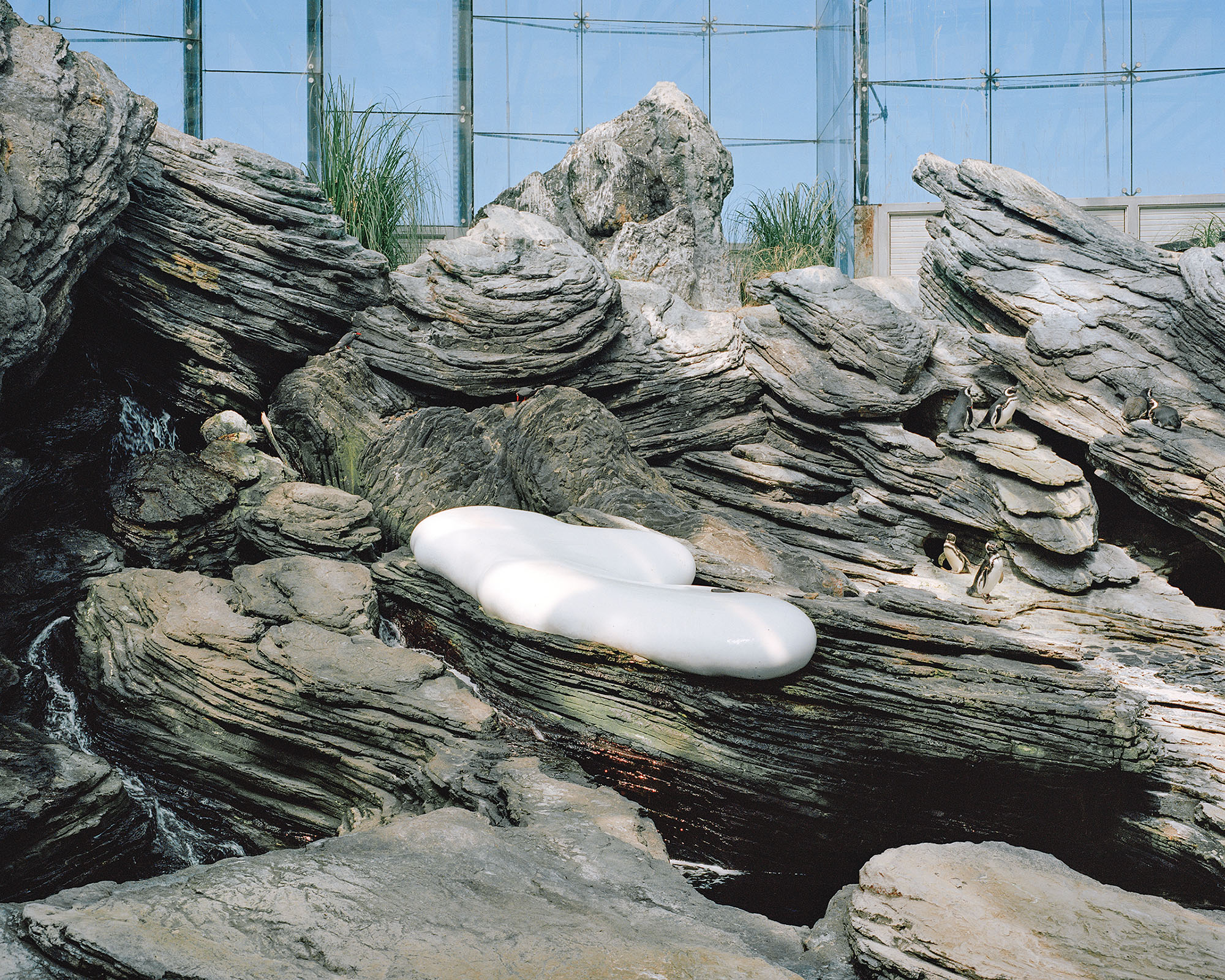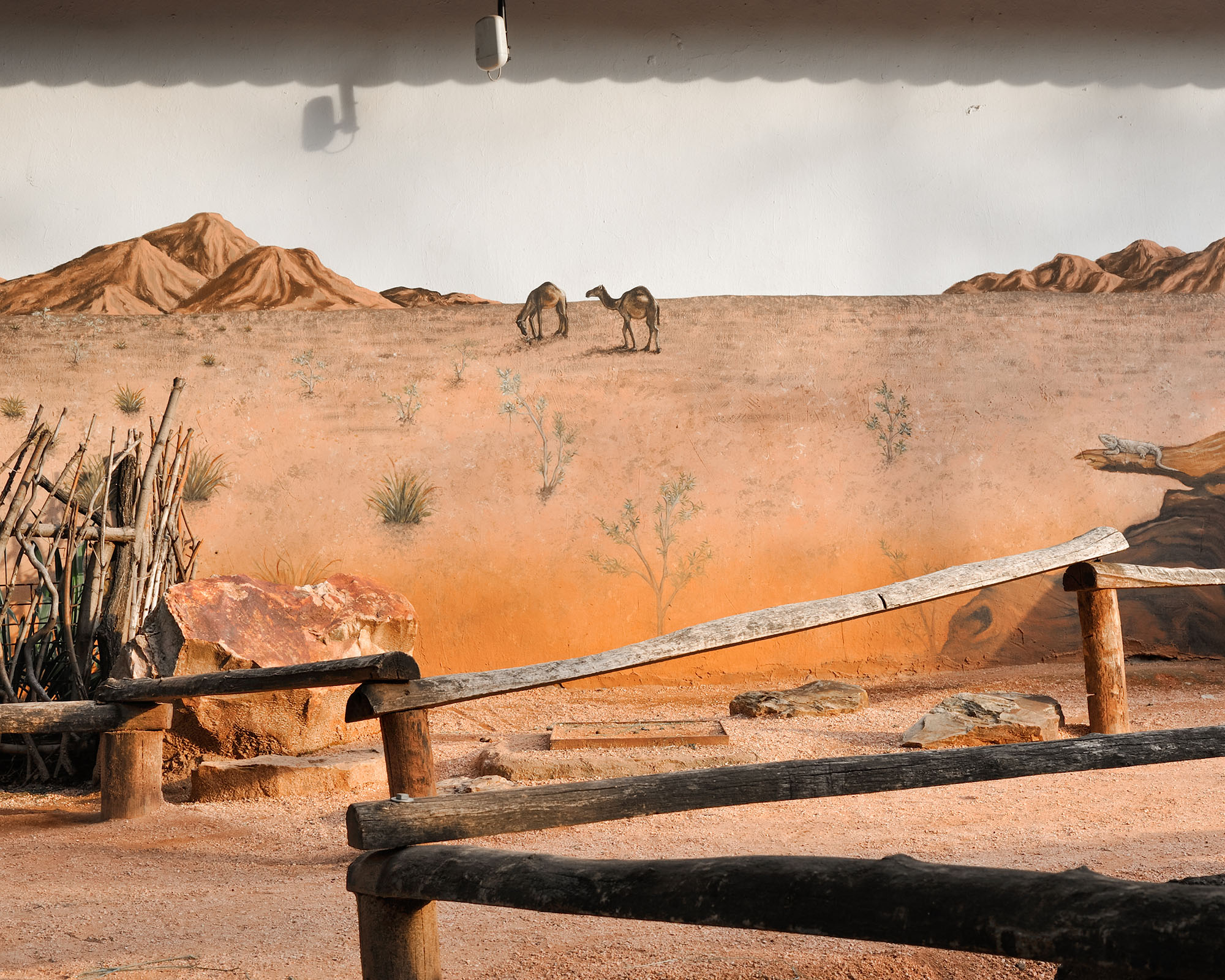Location: Switzerland
Date: 2017–2018
In the spring of 2012, a swiss Zoo set out to relocate two parrots previously kept in a cage to a new enclosure. In this new space, the two hyacinth macaws were no longer merely prisoners in a cage but were granted more room to move. Moreover, they were elevated to the role of ambassadors against the illegal wildlife trade, about which visitors could now educate themselves through various installations. The construction of this new enclosure, which meets today’s zoo standards, was among other things an attempt to redraw old boundaries. The two parrots, which in South American cultures are symbols of freedom, paid for the move to an open enclosure with the clipping of their wings. Because the birds could no longer fly and were eaten by a marten a year later, questions were raised as to why the Zoo had not “better protected the prison.” Thus, the chapter of the two parrots did not end with a reflection on the captivity of tropical birds, but with a comment and an implicit suggestion in the form of a technical answer to a practical problem. One must ask whether there is not something profoundly wrong with this image.
The question of humanity’s place on Earth has been pondered for thousands of years. Different cultures, at different times, have offered different answers. In Western philosophy, the human condition was, up to the modern era, predominantly understood as an intermediate state between animality and divinity: humans, it was thought, rule over all earthly beings.
Even in ancient Greece, a predominantly teleological understanding of nature prevailed. This meant that nature as a whole, including humans, was believed to develop according to a purposeful plan, always directed toward a higher, divine goal. The idea of the Scala Naturae, a great chain of being with humans as the highest creatures on Earth, is attributed to Aristotle (384–322 BCE). In his Politics, he notes that only humans can be understood as zôon politikón—political beings—since only they possess the God-given capacities of speech (logos) and reason. The differentiation of humans from others through the attribution or denial of certain abilities was first systematically formulated in ancient Greece by Aristotle. Following him, the Greco-Roman schools of thought—above all, Stoicism—further developed and radicalized the elevation of humans to a cosmic principle. They strongly influenced Christian theology: Augustine of Hippo (354–430) and Thomas Aquinas (1225–1274) further solidified the idea of a divine calling and the associated worldly hierarchy within Christianity.
As a result, the very possibility of reason was considered exclusive to humans. Augustine observed: “Therefore, the most just order of the Creator has adapted their [animals’] lives and deaths to our use: Thus the command applies only to humans: ‘Thou shalt not kill.’” For Aquinas, it is divine providence that grants humans their place as rulers of the world, thanks to the nobility of their rational nature. In modernity, these convictions were carried forward by various thinkers.
René Descartes (1596–1650), founder of early modern rationalism, postulated a strictly mechanistic view of animals. Descartes justified this belief by asserting that non-human animals were entirely devoid of reason and that only humans possessed a mind. With the breakdown of theological dominance beginning in the 16th century, new, diverging views on the relationship between humans and other animals began to emerge. Yet even these new perspectives failed to break with the fundamental distinction.
Although contemporary discourse increasingly asserts that humans should fundamentally reconsider their attitudes toward non-human animals and the environment, the belief in a fundamental difference in essence persists.
Date: 2017–2018
In the spring of 2012, a swiss Zoo set out to relocate two parrots previously kept in a cage to a new enclosure. In this new space, the two hyacinth macaws were no longer merely prisoners in a cage but were granted more room to move. Moreover, they were elevated to the role of ambassadors against the illegal wildlife trade, about which visitors could now educate themselves through various installations. The construction of this new enclosure, which meets today’s zoo standards, was among other things an attempt to redraw old boundaries. The two parrots, which in South American cultures are symbols of freedom, paid for the move to an open enclosure with the clipping of their wings. Because the birds could no longer fly and were eaten by a marten a year later, questions were raised as to why the Zoo had not “better protected the prison.” Thus, the chapter of the two parrots did not end with a reflection on the captivity of tropical birds, but with a comment and an implicit suggestion in the form of a technical answer to a practical problem. One must ask whether there is not something profoundly wrong with this image.
The question of humanity’s place on Earth has been pondered for thousands of years. Different cultures, at different times, have offered different answers. In Western philosophy, the human condition was, up to the modern era, predominantly understood as an intermediate state between animality and divinity: humans, it was thought, rule over all earthly beings.
Even in ancient Greece, a predominantly teleological understanding of nature prevailed. This meant that nature as a whole, including humans, was believed to develop according to a purposeful plan, always directed toward a higher, divine goal. The idea of the Scala Naturae, a great chain of being with humans as the highest creatures on Earth, is attributed to Aristotle (384–322 BCE). In his Politics, he notes that only humans can be understood as zôon politikón—political beings—since only they possess the God-given capacities of speech (logos) and reason. The differentiation of humans from others through the attribution or denial of certain abilities was first systematically formulated in ancient Greece by Aristotle. Following him, the Greco-Roman schools of thought—above all, Stoicism—further developed and radicalized the elevation of humans to a cosmic principle. They strongly influenced Christian theology: Augustine of Hippo (354–430) and Thomas Aquinas (1225–1274) further solidified the idea of a divine calling and the associated worldly hierarchy within Christianity.
As a result, the very possibility of reason was considered exclusive to humans. Augustine observed: “Therefore, the most just order of the Creator has adapted their [animals’] lives and deaths to our use: Thus the command applies only to humans: ‘Thou shalt not kill.’” For Aquinas, it is divine providence that grants humans their place as rulers of the world, thanks to the nobility of their rational nature. In modernity, these convictions were carried forward by various thinkers.
René Descartes (1596–1650), founder of early modern rationalism, postulated a strictly mechanistic view of animals. Descartes justified this belief by asserting that non-human animals were entirely devoid of reason and that only humans possessed a mind. With the breakdown of theological dominance beginning in the 16th century, new, diverging views on the relationship between humans and other animals began to emerge. Yet even these new perspectives failed to break with the fundamental distinction.
Although contemporary discourse increasingly asserts that humans should fundamentally reconsider their attitudes toward non-human animals and the environment, the belief in a fundamental difference in essence persists.







